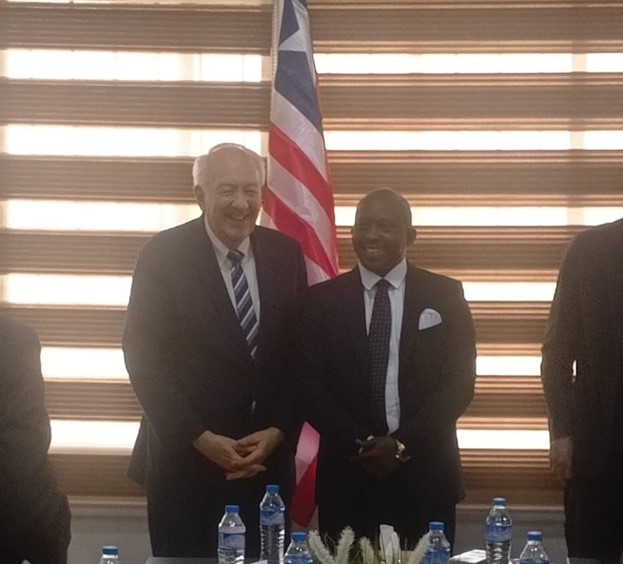A high-level delegation focused on transitional justice recently concluded a productive visit to Monrovia, Liberia, engaging in critical discussions with Dr. Cllr. Jallah A. Barbu, Executive Director of the Office for the Establishment of War and Economic Crimes Court for Liberia (OWECC-L). The delegation’s primary objective was to assess the office’s capacity, identify existing challenges, and explore collaborative avenues to support the establishment of a specialized court to address war crimes, economic crimes, and human rights abuses committed during Liberia’s turbulent past. The visit underscored the international community’s commitment to ensuring accountability and fostering reconciliation in Liberia.
Dr. Barbu provided a comprehensive overview of the OWECC-L’s progress, highlighting the significant support garnered from various stakeholders, including international organizations, donor countries, Liberian civil society organizations, and the Independent National Human Rights Commission. This widespread endorsement has propelled the initiative forward, facilitating crucial consultations and contributing to the refinement of the court’s framework. Dr. Barbu emphasized the ongoing collaboration with the Liberian National Bar Association and the Law Reform Commission to address potential legal obstacles that could impede the establishment of a hybrid court, demonstrating a proactive approach to ensuring the court’s effectiveness and legitimacy. He expressed optimism that, with continued collaboration and support, both a War Crimes Court and an Anti-Corruption Court could be established before the conclusion of President Joseph Nyumah Boakai’s administration.
The delegation, led by advisor Katherine Southwick, acknowledged the financial challenges associated with establishing and operating such a complex judicial mechanism. However, they encouraged Dr. Barbu to maintain his engagement with potential donors, emphasizing that while funding for these initiatives can be slow or even unattainable at times, persistent outreach and demonstrated commitment can yield positive results. The delegation commended the OWECC-L’s proactive engagement with victim advocacy groups and its prioritization of witness protection, recognizing these as crucial elements in ensuring a fair trial process and encouraging victims and witnesses to come forward without fear of reprisal.
The OWECC-L’s focus on victim and witness protection mechanisms resonated strongly with the delegation. They emphasized the critical importance of creating a safe and supportive environment for individuals who have suffered during the conflict to testify without fear of intimidation or harassment. Such protections are not only essential for ensuring justice and accountability but also for fostering societal healing and reconciliation. By prioritizing witness protection, the OWECC-L demonstrates its commitment to a victim-centered approach, recognizing the profound impact that these crimes have had on individuals and communities.
The delegation’s diverse composition reflected the multifaceted nature of the task at hand. It included prominent figures with extensive experience in international criminal law and transitional justice, such as Ambassador Stephen Rapp, formerly of the International Criminal Court (ICC), and Susan Oklanay of the Uganda Judiciary. Salieu Tall of the Gamba Bah Association brought valuable expertise on human rights advocacy, while Daniel McLaughlin and Alex Kohls represented the Center for Justice and Accountability (CJA), an organization renowned for its work in pursuing accountability for human rights violations. The delegation also benefited from the insights of Binta Mansasaray, registrar of the Sierra Leone Special Court, who brought practical experience in establishing and administering similar judicial mechanisms. Other CJA representatives, including Sara Pearce, Derick Cogram, Didier Gbery, and Rebecca Senior, further strengthened the delegation’s expertise in legal and advocacy matters.
The delegation’s visit signifies a crucial step in Liberia’s ongoing pursuit of justice, accountability, and reconciliation. By engaging with the OWECC-L and other stakeholders, the delegation sought to gain a deeper understanding of the context, challenges, and opportunities associated with establishing the proposed courts. Their assessment will inform future strategies and support efforts, contributing to a more robust and effective transitional justice process in Liberia. The meetings with Liberian judicial actors and advocacy groups scheduled toward the end of their visit will further enrich their understanding and facilitate a more comprehensive and nuanced approach to addressing the legacy of past atrocities. Dr. Barbu expressed confidence that this collaborative effort will contribute significantly to healing the wounds of the past and building a more just and peaceful future for Liberia.
The commitment of the Liberian government, coupled with the support of the international community, underscores the recognition that addressing past atrocities is not merely a legal imperative but a moral one. By pursuing accountability for war crimes, economic crimes, and human rights abuses, Liberia is taking a crucial step towards breaking the cycle of violence and impunity. This commitment sends a powerful message to victims and survivors that their experiences are acknowledged and that justice will be pursued. It also serves as a deterrent to future perpetrators, reinforcing the principle that those who commit such crimes will be held accountable. The establishment of these courts represents a vital investment in Liberia’s future, paving the way for a more just, equitable, and peaceful society.














